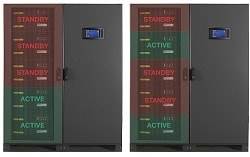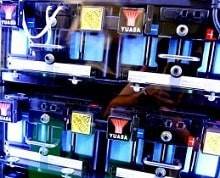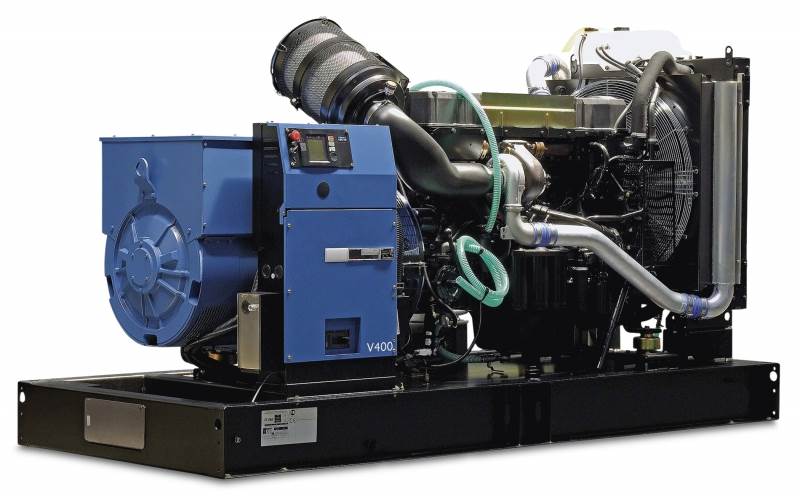- Contact 0870 350 7767
- |
- Advertise
Future trends for UPSs
 News and PR from Kohler Uninterruptible Power - Published 02 November 2017
What does the future hold for UPS technologies and systems? We asked Alan Luscombe, Director at UPSL, for his views, as summarised below.
News and PR from Kohler Uninterruptible Power - Published 02 November 2017
What does the future hold for UPS technologies and systems? We asked Alan Luscombe, Director at UPSL, for his views, as summarised below.Currently, the hottest topic is the lithium-ion vs. VRLA lead-acid debate. Li-ion offers several advantages, including lower TCO, longer life, smaller size and weight, and higher operating temperature tolerance. However, although li-ion market share has been growing steadily over the last two-three years, especially as prices have been dropping, VRLA is not expected to disappear soon. The biggest barrier appears to be li-ionÂs higher initial cost.
We have seen a steady growth in demand for modular UPS technology over the last two years, especially in higher-power applications. While products below 200 kVA are widely available, there is currently only two competitors for our PowerWave 9000DPA, and our PowerWAVE 9500DPA at 500 kVA is unique for now. However, players are entering the market for 300 kVA and beyond. We are also seeing more Asian products coming onto the UK market.
As winter approaches, we have no tangible evidence of utility power problems  there currently appears to be Âjust enough capacity. More nuclear energy capacity will ease the pressure, but this is very slow in developing.
Business forecasting is difficult, with so many unknowns, primarily Brexit. An IHS Research forecast for the UK predicted a negative economic impact from Brexit, but actually the economy has continued to grow. The largest effect has come from the falling pound.
Another trend that will continue after Brexit is the governmentÂs commitment to reducing carbon emissions. Compliance criteria will become ever more stringent, while the Department of Energy and Climate ChangeÂs Enhanced Capital Allowance (ECA) scheme rewards eligible energy-saving equipment with tax breaks. These realities, plus the threat of higher energy costs, are driving the market for higher-efficiency UPSs, with efficiency norms moving from 95% to 96% now, and 97% being forecast.
There is also an increasing demand for UPSs capable of dynamically adjusting their capacity, and especially reducing it to improve efficiency, if the load is unexpectedly low. This facility is useful in converged infrastructure, virtualised data centres, where servers are dynamically allocated  or de-allocated  to match changing software workloads.
Users increasingly expect to see their UPS online as an intelligent network node. Specifically, they want immediate warning of impending problems, enabling rectification before failure. Allowing third-party maintenance organisations to run a predictive maintenance service through 24/7 remote monitoring is particularly important.
UPS intelligence can also aid longer term power system management and optimisation, through load monitoring, regular reports on UPS status, and analysis of trends over time.
To read the rest of the article please visit: http://www.upspower.co.uk/future-trends-upss/

 Users increasingly expect to see their UPS online as an intelligent network node.
Users increasingly expect to see their UPS online as an intelligent network node.

Other announcements from Kohler Uninterruptible Power
-
Understanding your UPS batterys amp-hour rating
If youre specifying a UPS system, then its absolutely essential that you truly understand its battery autonomy; for how long will it support the load if the AC supplies fail?
14 May 2018
-
Keeping UPS availability high
When data centre operators invest in UPS systems, its for one purpose only; to maximise power availability for their facilitys ICT equipment.
14 May 2018
-
UPS, heal thyself
UPSs exist solely to deliver clean, uninterrupted power to their critical load but their ability to do so is entirely bounded by their resilience to failure of their own components or subsystems.
31 Aug 2017
-
Maintaining UPS efficiency when the load size diminishes
Modular UPS technology, as implemented in systems such as UPSLs PowerWAVE 9500DPA, is now being exploited in a smart solution that maintains UPS efficiency even when the UPS load is severely reduced.
30 Aug 2017
-
Is it time to consider Lithium-ion batteries?
Why hasnt the industry adopted lithium-ion solutions with greater enthusiasm, and is this likely to change? We can answer these by looking at factors relating to both lead-acid and lithium-ion bat.
30 Aug 2017
-
How UPS efficiency can contribute to data centre PUE
Improving UPS efficiency can help to better data centre PUE performance. The article discusses the options for this available to UPS operators who invest in the right, transformerless technology UPSs.
30 Aug 2017
-
The Internet of Things, data centres, and UPSs
The Internet of Things (IoT) is gaining traction at an accelerating pace; Gartner has predicted 26 billion connected devices by 2020, while others are calling even higher numbers.
30 Aug 2017
-
Director's Blog: So just what exactly is a UPS?
This blog written by Alan Luscombe, UPS Ltd Director, explains what a UPS is, as well as putting the various risks averted by UPS systems into perspective.
03 Aug 2015
-
Choosing a generator for data centre power protection
UPS generators are no longer just a backup plan. Today, they are considered a vital component of a companys power protection policy, as sizing UPS batteries for protracted power blackouts is simply uneconomic and impractical. In choosing a generator for a data centre or other critical IT load application, a number of factors must be considered. These include the generators key components, environmental issues and the qualifications of the suppliers as well as compatibility with the UPS to be supported. In this article, Alan Luscombe, director at Uninterruptible Power Supplies Ltd., a Kohler company, discusses how generators work with UPSs, and the factors you must consider when choosing a generator as part of your power protection policy.
23 Jul 2015







